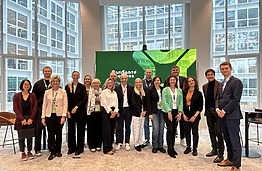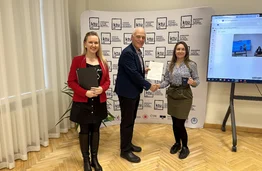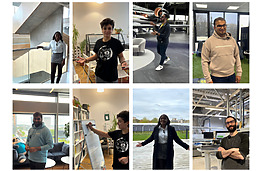Technological change is a long-term systemic process that will have a profound impact on all business management practices and the economy, regardless of the industrial sector in which companies are located and the institutional context in which they operate. Scientific input and collaboration with business and public sector organisations is critical to the exploration and development of new business models and forms of work organisation, new skills and new performance management, legal and regulatory frameworks at regional, national and EU levels. The idea of the KTU SEB Business Clinics is based on:
The Hands-On (hereinafter – the Project) is an optional module for second-year master’s students of the KTU School of Economics and Business and other stakeholders (students of other KTU faculties, ECIU network students, and business representatives), who intend to deepen the competencies of socio-economic assessment, strategic management, organizational design, project management, change management, and investment evaluation.
Business administration KTU MBA is a year-long journey of the development of change leadership and resistance to changes in the business environment. This study programme will provide the latest knowledge and international practices and skills necessary to develop an innovative business and a resilient organization. That is why change initiation and management are chosen as the axis of the KTU MBA study programme.
This programme is intended for managers of business companies and organizations in the regions, managers of small and medium-sized companies, and middle managers of large companies responsible for implementing changes in organizations.
This is a joint Kaunas University of Technology and ISM University of Management and Economics MBA Executives master’s degree program.
The degree program is designed to help overcome the challenges faced by determined and talented leaders. The program is based on modern teaching methods in the field of management and meets today’s needs of the business market and society.
The Bachelor’s study programme “Business and Entrepreneurship” is organized according to a new and innovative study model in Lithuania, focused on the development of practical skills. The programme includes two specializations: “Export Management” and “Business Strategy and Sales”, which emphasize the application of theoretical knowledge in business enterprises while working full-time.
During the internship, students implement a personal program for the development of internship tasks and business competencies, which is prepared by a tripartite agreement between the company, the student and the university before the internship begins.
The internships are carried out in February-May (Rotation I) and September-December (Rotation II). Next placement: 1 February 2024 to 6 June 2024 (exactly 18 weeks). Companies are welcome to register!
UP4SKILL is a platform that offers diverse and contemporary learning opportunities that cater to the needs of all learners. The University aims to provide modern and comprehensive development pathways that are flexible and adaptable. By leveraging science-based knowledge, innovative teaching methods, and an understanding of the current labour market, society, and individual needs, KTU offers a range of courses and learning experiences for those seeking personal growth and skill development.
The vision of lifelong learning at KTU is to establish itself as a competitive institution that nurtures the development of competencies relevant to the labour market. This involves creating flexible learning pathways that align with the ever-evolving needs of learners.






















